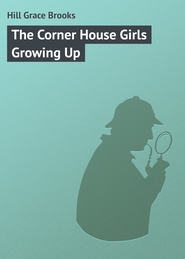По всем вопросам обращайтесь на: info@litportal.ru
(©) 2003-2024.
✖
The Corner House Girls' Odd Find
Настройки чтения
Размер шрифта
Высота строк
Поля
They were shabby people and both had bundles tied to the end of stout staves. Evidently they had either walked far, or had stolen a ride upon a freight train to this spot. There was a water-tank in sight.
The boy, who was thin, and tall, and wiry looking, slipped the bundle off his stick, and seizing the stick itself as a club, advanced stealthily around one side of the fire. The man seemed to be a much more indecisive sort of creature. His smooth face was like parchment; his ears stood out like bats’ wings. No one could honestly call him good looking. Rather was he weak looking; and his expression was one of melancholy.
Somehow, Agnes was not much afraid of the man. It was the boy who made her tremble. He looked so wild, and his eyes blazed so as he clutched the stick, creeping nearer to Agnes all the time.
As he advanced, Agnes began to retreat, stepping slowly backward. She would have run at once, trusting to her lightness of foot to relieve her of the boy’s company in a few rods, had it not been that she remembered the unknown and savage beast that had followed her to this spot.
It must have been this boy’s voice she had heard; yet it sounded just like a girl’s. Agnes was greatly puzzled by the youth’s appearance. She looked again over his supple, crouching body as he advanced. It was wide-hipped, narrow-waisted, and not at all boyish looking. Despite the thinness of this young stroller, his figure did not at all suggest the angles of a boy’s frame.
Aside from being puzzled, Agnes Kenway was much afraid of him. His face was so keenly threatening in expression, and his stealthy actions so antagonistic, that the Corner House girl almost screamed aloud. Finally, she found relief in speech.
“What are you going to do with that stick? Put it down!” she cried.
“I – I – You’ve been listening to us talking,” said the boy. But it was the girl’s voice that spoke.
It did not sound like a boy’s voice at all. It was too high, and there was a certain sweetness to it despite the tremor of the notes. Agnes began to recover her self-possession. She might have been afraid of a reckless boy. But she was strong herself, and agile. Even if the other did have a stick —
“You were listening,” cried the other accusingly, again. “Yes, I was listening – a little,” confessed the Corner House girl. “But so would you – ”
“No, I wouldn’t. That’s sneaky,” snapped the other.
“How about your finding out about the book of money you spoke of?” asked Agnes, boldly. “Didn’t you do anything ‘sneaky’ to find out about that?”
The other started and dropped the stick. The man sat down suddenly. It was plain, even to usually unobservant Agnes Kenway, that her remark had startled both of them.
“I was alone – and lost,” Agnes went on to explain. “I was trying to reach Mr. Bob Buckham’s farm, and a wolf chased me – ”
“A wolf!” interrupted the youthful tramp. “Now I know you’re telling a wicked story.”
“It was. Or something,” said Agnes, stoutly. “I was scared. Then I saw your smoke.”
“Why didn’t you walk right in and speak to us instead of snoopin’?”
“You’d have ‘snooped’,” flashed back Agnes, with some heat. “I was alone, and I was afraid of tramps – ”
“Well, we’re tramps,” said the boy, stooping and picking up the dropped stick.
“Not the kind I am afraid of,” Agnes replied, trying to smile.
The boy would not be pacified, but the man said, shakingly, from his seat on the log:
“We wouldn’t hurt you, girl. Put down that stick, Barney. This is my son, Barney, and I’m Asa Scruggs. I’m a joey when I’m in luck, and Barney – he’s a trapeze artist. He’s good.”
“Oh, Pop!” shrilled the youthful trapeze artist, “might’s well tell the truth this time. She’s nothing but a girl herself.”
“And that’s what you are!” cried Agnes, with excitement.
“Yes. I’m Barnabetta, not Barney, Scruggs. Nice name, isn’t it?” scoffed the strange girl. “My mother was Pennsylvania Dutch; that’s where I got my name, Barnabetta. But it’s safer to travel as a boy, so I’m Barney on the road. Besides, skirts would be in the way, climbing in and out of ‘rattlers.’”
“Oh, what fun!” gasped Agnes. “Do you and your father always travel this way?”
“You bet we don’t! Not when we have an engagement. We’ve ridden in Pullman cars – haven’t we, Pop?”
The man nodded. He did not say much but watched Agnes with eyes that, in a child, the girl would have thought expressed terror. Barnabetta was much the stronger character of the two, the Corner House girl was positive.
“But where are you traveling now?” asked the interested Agnes.
“We’re aimin’ on gettin’ South, miss. There’s tent shows there all winter long,” said the man, plaintively. “I’ve been laid up with my ankle, and it’s too late to get any bookings worth while through the usual vaudeville agencies. We been workin’ for Twomley & Sorber’s Herculean Circus and Menagerie; but of course they’re in winter quarters now at Tiverton. That’s where I got hurt – right at the end of the season, too.”
Agnes’ brain was working busily. Twomley & Sorber’s at Tiverton. Tiverton was where the letter was postmarked that had taken Neale O’Neil away from home so strangely. The talk she had just overheard assured her that these two circus performers had been conversing about Neale and the old album full of money and bonds that he had taken away with him.
But she caught the disguised Barnabetta watching her very sharply. That girl’s black eyes were like glittering steel points. They seemed to say: “How much does this girl who listened guess – how much does she suspect – how much does she know?”
“We’ve got to work up some kind of patter to go with our act if we strike a job,” said Barnabetta, still with her eyes fixed on the Corner House girl. “You’ve got to have something new if you expect to put any act over these days. Pop’s a good joey – ”
“I suppose you mean a clown?” asked Agnes.
“Yep. How’d you know?” sharply retorted Barnabetta.
“I – I’ve heard the word used before,” admitted Agnes, seeing that she had been unwise. “Then you know circus folks?” observed the suspicious trapeze artist.
“Oh, no!”
Barnabetta was not convinced, that was plain. But she turned in a matter-of-fact way to the man. “Well, Pop,” she said coolly, “about that money.” The man jumped, and his weak eyes opened wide. But Barnabetta kept right on and Agnes was sure she was winking at her father. “You must disbelieve me when I say I saw it, and I’m goin’ to say we’ll get it,” she declared.
“Huh?” gasped the clown.
“That’s the way it must be in our act,” the girl said firmly. “In our act – don’t you see?”
“Oh! Ha! Hum!” said the clown, clearing his throat. “I see.”
“This is second-story work,” the girl explained eagerly. “I’ll show you how to climb up to the window for the money – that’s to the trapeze, you see,” she added, throwing the explanation at Agnes.
“Oh! I see,” murmured the Corner House girl.
“And you play the joey part, Pop,” pursued Barnabetta. “I’ll go ahead, and say ‘Hist!’ and ‘Take care!’ and ‘Clumsy!’ and the like, making believe we’re going to rob a house. You do the joey, as I said, and climb almost up to the trapeze on the rope, and then make a fall. We’ve got to get the laughs,” she added again, glancing sidewise at Agnes.
The latter felt very peculiar indeed. Bluntly honest, it was hard for Agnes to play a part in this way. She knew the girl trapeze performer was trying to lead her astray. Barnabetta and her father were talking of Neale and his money before Agnes appeared, and this tale about the new act was being invented on the spur of the moment to confuse her.
Barnabetta stopped suddenly. Perhaps she saw that her tale was making little impression upon their visitor.
“Where were you going, miss?” asked Mr. Scruggs, after a minute’s silence.
“I was on my way to visit Mr. and Mrs. Buckham. They expect me,” said Agnes, wisely. “But I must have missed the road. I know where I am now, however, I’ll go down the railroad beyond the water-tank a little way and find the very crossing of the lane that goes into their dooryard from the west. Those trees must hide the house from here.”
Secretly Agnes wanted to get away, but not to visit Mr. and Mrs. Buckham. She felt that she ought to communicate with Neale O’Neil just as soon as possible. This old clown and his disguised daughter might have a plan to stop Neale on his way home and take the old album and its precious contents away from him.
For now Agnes, like her sister, Ruth, had begun to believe that the engraved slips of paper pasted into the book were “really truly” banknotes. How they had gotten there, and who they originally belonged to, Agnes could not guess. Nor did she believe that Neale O’Neil had carried them off with him, knowing them to be good currency.










